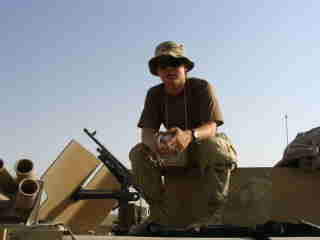I caught a news report about mental health statistics from Iraq recently. Seems there's been ongoing tracking by Army Mental Health Advisory Teams, and they recently released their fourth report.
The report, in its PDF entirety, can be read here.
A nice summary (courtesy of Slate.com) can be found here.
I'm not going to dig through it and comment a whole lot. I'm not a psychologist, and I'm not comfortable taking my weird and limited experience and using it as a podium on this particular subject. I'm going to point out a few helpful things from this summary (which I chose because I can copy and paste from it).
“The most stressful part of my job is going out every day and waiting to get blown up.”
This is comment from a junior NCO, and it gets to the heart of one of the most frightening things in this war - you can do everything right and still die.
...the Congressional Research Service reported in 2005 that IEDs caused about half of all U.S. combat fatalities and casualties in Iraq and are killing hundreds of Iraqis
That's from a different report. But the randomness of the single largest threat in this particular theater makes it a heavy burden - soldiers and Marines are, by training, inclined to be aggresive. Dealing with a constant threat that can't be shot, often can't be seen and can exist pretty much anywhere takes a vastly different toll than engaging an organized force of enemy riflemen. Not necessarily a greater toll, or a lesser one, simply a different toll.
Another stressor cited...
Being in threatening situations where you were unable to respond due to ROEs
This is touchy. Strict ROE are vital in this kind of weird-ass war. But there are times when you don't want soldiers to hesitate. And once they watch a couple of vigorous 15-6 investigations over warning shots...it's going to stick in their minds.
OK. Enough parsing through this. It's good reading, and whether or not you support what we've got going on in Iraq, you should take the time to skim through it.
I'll add that the Army deserves a pat on the back for at least trying to get a handle on mental health issues. They are making an effort - there are Combat Stress Control teams deployed at the battalion level in theater, and they're doing good work. Returning soldiers fill out surveys including mental health information. It's not perfect, but it's much better than they've done in the past.
Read it and think about it. We owe it to our warriors to try to understand the repercussions of what they're doing for us.
Oh yes - one addition from pages 17 and 18 of the long version (the first link). Silly rules about the specifics of wear for the PT uniform aggravate the shit out of everyone who is supposed to be concerned with fighting a war. Go figure.

|